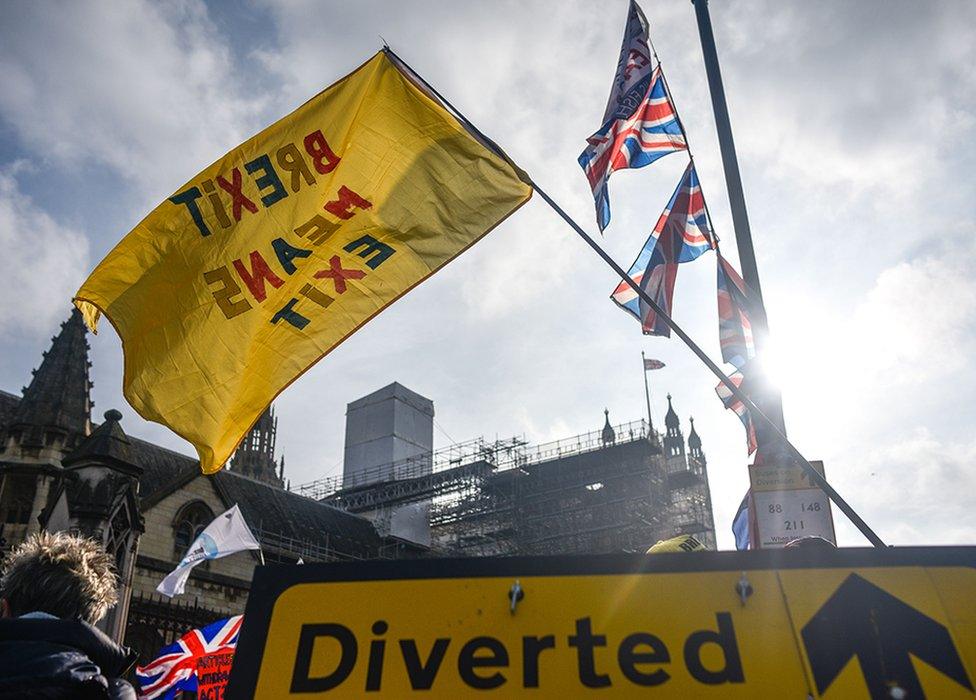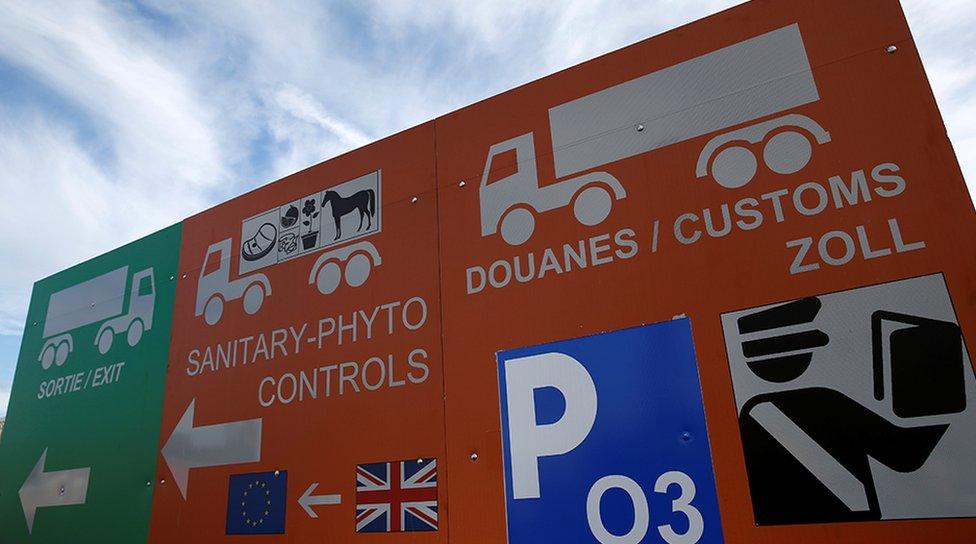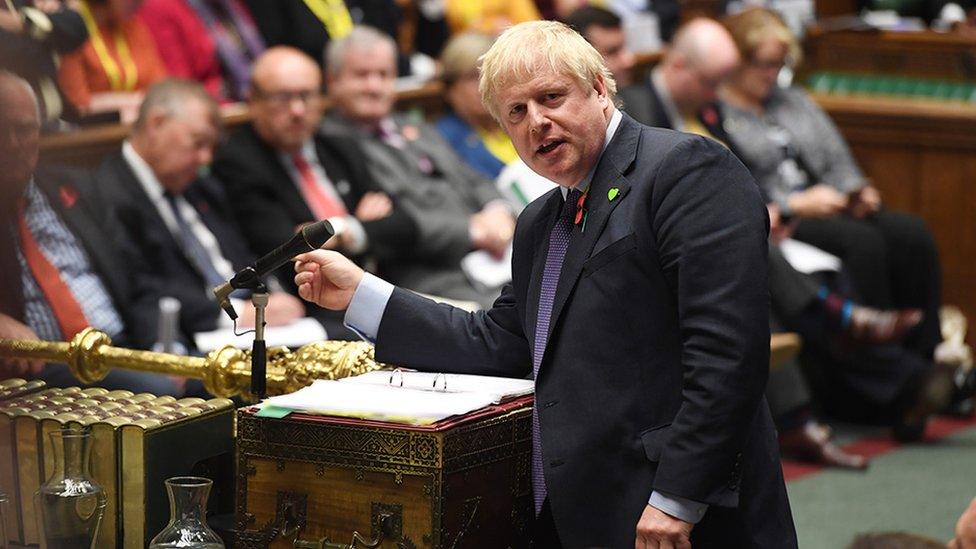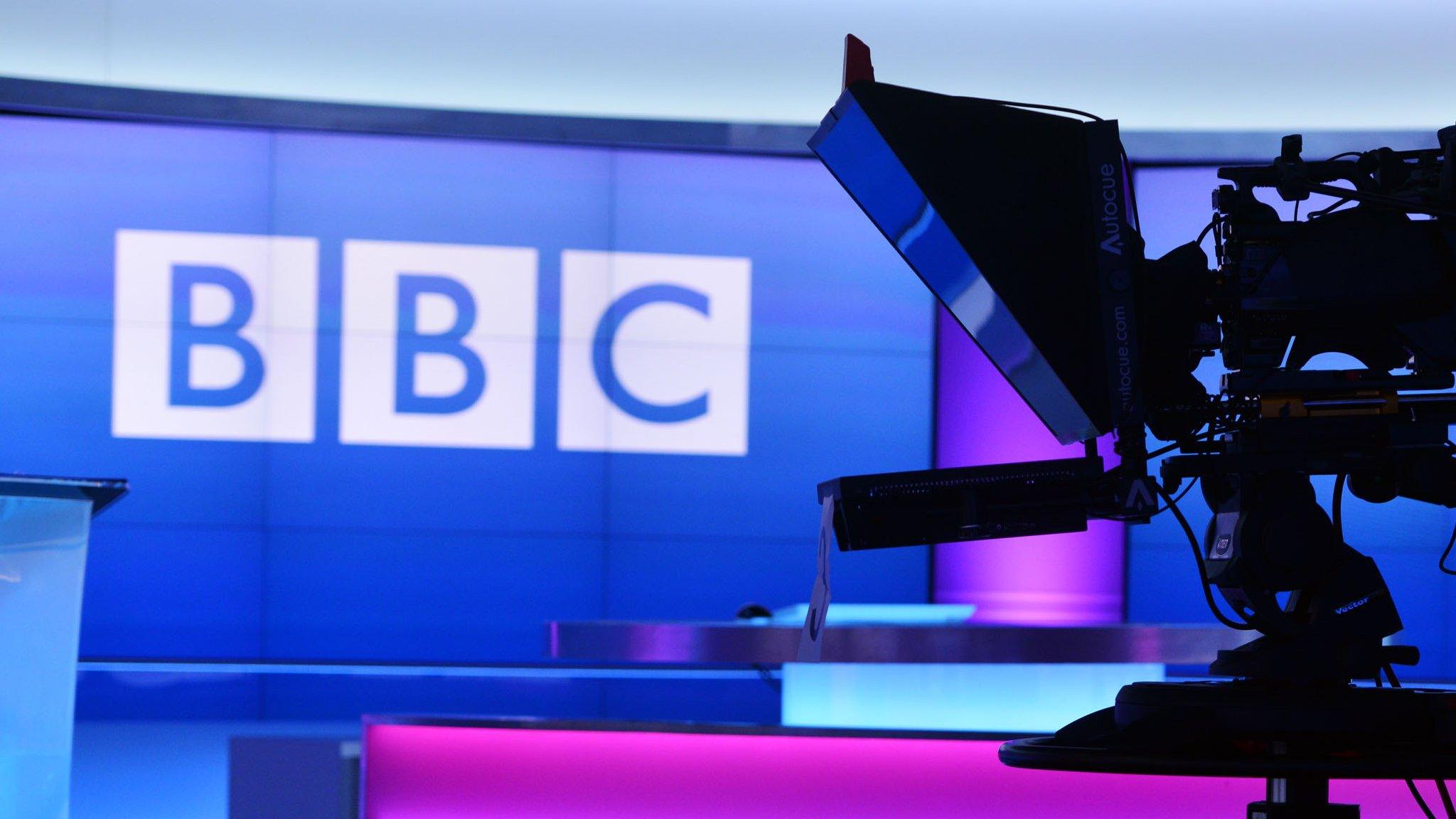Brexit: Better or worse off? And can anyone really say?
- Published
Scots could be £1,600 per year "worse off" due to Boris Johnson's Brexit deal, say Scottish government ministers.
What does that mean? How is that calculated? What are the assumptions behind it? How does it compare with other options?
Is the claim reliable? And what about the Prime Minister's claims that Brexit will lead to a "glorious" future for Britain and Scotland?

The Brexit issue has dominated daily politics since the UK voted to leave the EU in June 2016

Boris Johnson's Brexit deal will cost everyone in Scotland £1,600 per year. That's the charge, being led by Mike Russell, the Scottish government's Brexit minister. Expect to hear it again over the election weeks and beyond. And again after that.
So where does it come from, and how does it stack up?
It's in a new document, providing the Scottish government's assessment of the Brexit deal negotiated by Boris Johnson, external, which secured a majority - in principle - in the House of Commons, and will form a core part of the Conservative Party's election campaign.
The figures are derived from a Scottish government analysis published in January 2018, external. Behind it are a lot of assumptions about what might happen if there were to be a Free Trade Agreement (FTA) between post-Brexit Britain and the European Union.
The analysis looks at other outcomes of the talks, long before Theresa May got to her deal with the EU, let alone Boris Johnson re-negotiating it. One was to remain within the European Economic Area, something like Norway - inside the single market, but in Norway's case, outside the customs union.
The alternative was the most bracing for the economy - known as WTO, referring to World Trade Organisation rules. That is the baseline for countries that don't have trade deals, where many goods have no tariffs applied (taxes on imports) but quite a few do, and where there is little done to converge and standardise countries' internal market rules.
The FTA version points to the total output of the economy, in 2030, being 6% below the level it would have reached if the UK economy remained on the growth trajectory it has had as a member of the EU. That equates to £9.1bn per year, at 2016 prices. Divide that by the population, and you get to £1,610 per head. By rounding down £10, that's where Mike Russell's number comes from.
Will we be worse off?
No, though that is how it can be made to look. The SNP put out a press release on Wednesday, claiming: "New analysis from the Scottish government has found that Boris Johnson's revised Brexit deal would leave people in Scotland £1,600 per head worse off by 2030."
That's misleading, firstly because that appears to relate to average pay. It does not. It is a notional share per head of total national output, and part of that share goes to wages, part to profits, including some paid to foreign owners of assets in Scotland.
The assessment also points to Scots being worse off than they might otherwise have been - not worse off than they are.
A common feature of this type of economic modelling is that it measures how much slower the economy would grow, when compared with the trend growth within the European Union. Growth would be lower, but would remain positive.
If the UK were to be in the European Economic Area, like Norway, then it would see a smaller dip according to this economic model - of 2.7% of total national output, or £688.
For it to leave the EU without any deal, and use WTO rules for trading, the calculation is a drop of 8.5% of output by 2030, or £2,263 per head.
In the latter case, the separate reckoning of the Fraser of Allander Institute at Strathclyde University is that Scotland would become worse off, for a while. It recently forecast a contraction in the economy during next year, before returning to weak growth from 2021.
What about evidence that Brexit will be to Britain's economic advantage?

What might change at ports like Calais after the UK leaves the EU?
Almost all economic models reckon that any Brexit outcome would leave the UK worse off than it would be if it continued within the European Union, at least until its economy and businesses adapt to the shock, and find new trading arrangements with Europe and beyond.
That includes the Treasury modelling. The Johnson administration has been pressed to produce estimates of the economic impact of the deal struck with the European Union, but it has chosen not to do so.
It matters how long a transition to new, stable trading relations would take. Boris Johnson would like to get to that deal before the end of next year, when the transition period is due to end.
However, trade negotiations usually take several years to reach an agreement. In recent times, several have been abandoned before getting to a deal, such as the Trans-Atlantic Trade and Investment Partnership (TTIP), being negotiated between the pre-Brexit referendum European Commission and the pre-Trump United States.
Britain would want to get to a deal as fast as possible, while its negotiating partners would have less pressure to do so. That puts Britain in a weaker negotiating position.
What about the assumptions that underlie these calculations?
The post-Brexit outcome of a Free Trade Agreement with the EU is assumed to mean a cut in the share of exports within the EU of 29%, and no increase in tariffs.
Productivity is expected to fall below the levels that should be achievable within the EU, by 3.5% - the same as the Treasury assumption for the whole UK.
That is partly explained by the reduction in inward investment. Foreign companies clearly tend to bring in more productive ways of working, which spread through the economy. Without easy access to EU markets, Britain could be less appealing to them.
The fall in foreign investment is assumed to be 17.5%. The population would grow at 2.8% below that assumed through the free movement of EU citizens, drawing on work done by the Office for Budget Responsibility.
And remember the Leave campaign claims of billions of pounds made available by not handing money to Brussels? That would help the economy a little - around a third of one per cent of total output.
Looking at similar attempts to calculate this - from the Treasury to the OECD richer countries' club and the Fraser of Allander Institute - a similar set of assumption is made.
Can these figures be trusted?
All such figures can be rubbished, according to taste and prejudice. There were, indeed, wild warnings about a Leave vote's immediate impact. The economy has not been in recession, and the labour market remains uncommonly strong.
However, the effect of slower growth than the economy would otherwise have achieved is not obvious unless you refer to your EU neighbours and see how they have been pulling ahead. For those who travel in the eurozone, it is clear that British pound's buying power has declined. For those who don't travel overseas, the weaker pound has led to food price inflation, but not to an alarming extent.
So, while the UK and Scotland have not become worse off than they were, they have become worse off than they would otherwise have been. The Fraser of Allander Institute recently published its estimate of how much Scotland has already fallen behind, external the position it might otherwise have been in - during the 40 months since the referendum. It said that Brexit uncertainty "continues to act as a drag on Scotland's economy with output around 2% smaller (or £3bn) as a result of the weaker performance post-referendum".
And remember that the £1,600 figure, as with the others, is an average. If it were to be correct, some could be much better off because of Brexit: others much worse off.
What else is in the Scottish government's assessment of Boris Johnson's Brexit deal?

Boris Johnson's deal will be the subject of discussion at the December election
There is a new concern that the different arrangements for Northern Ireland threaten to put it at an advantage over Scottish businesses, in having easier access to the European single market. The extent of that divergence would depend on the nature of a Free Trade Agreement, so it is hard to quantify until that deal is done.
The concerns of the food and drink sector, and particularly seafood, are to the fore in the ministers' analysis. And services are seen as a potential victim of being overlooked in favour of goods trade.
Immigration, the decline of the working population and access to EU higher education funding, of which Scotland gets a large share, are also raised. In common with other opposition parties in the House of Commons, Scottish ministers are concerned at the apparent weakening of previous commitments to labour, environmental and human rights protections.
These can still be found, but no longer in the Withdrawal Agreement. They are in the non-binding outline of the long-term UK-EU relationship, and could be negotiable in trade negotiations with other countries, including the USA.
Theresa May's deal focused on a UK relationship with the EU which would be "as close as possible". Boris Johnson's replaces this with an "ambitious" relationship.
In the final, pre-election Question Time joust between Boris Johnson and Jeremy Corbyn, the intention of a deregulated deal with the USA, potentially opening the National Health Service to far more private sector influence, was the main thrust of the Labour leader's campaign message.
- Published24 October 2019


